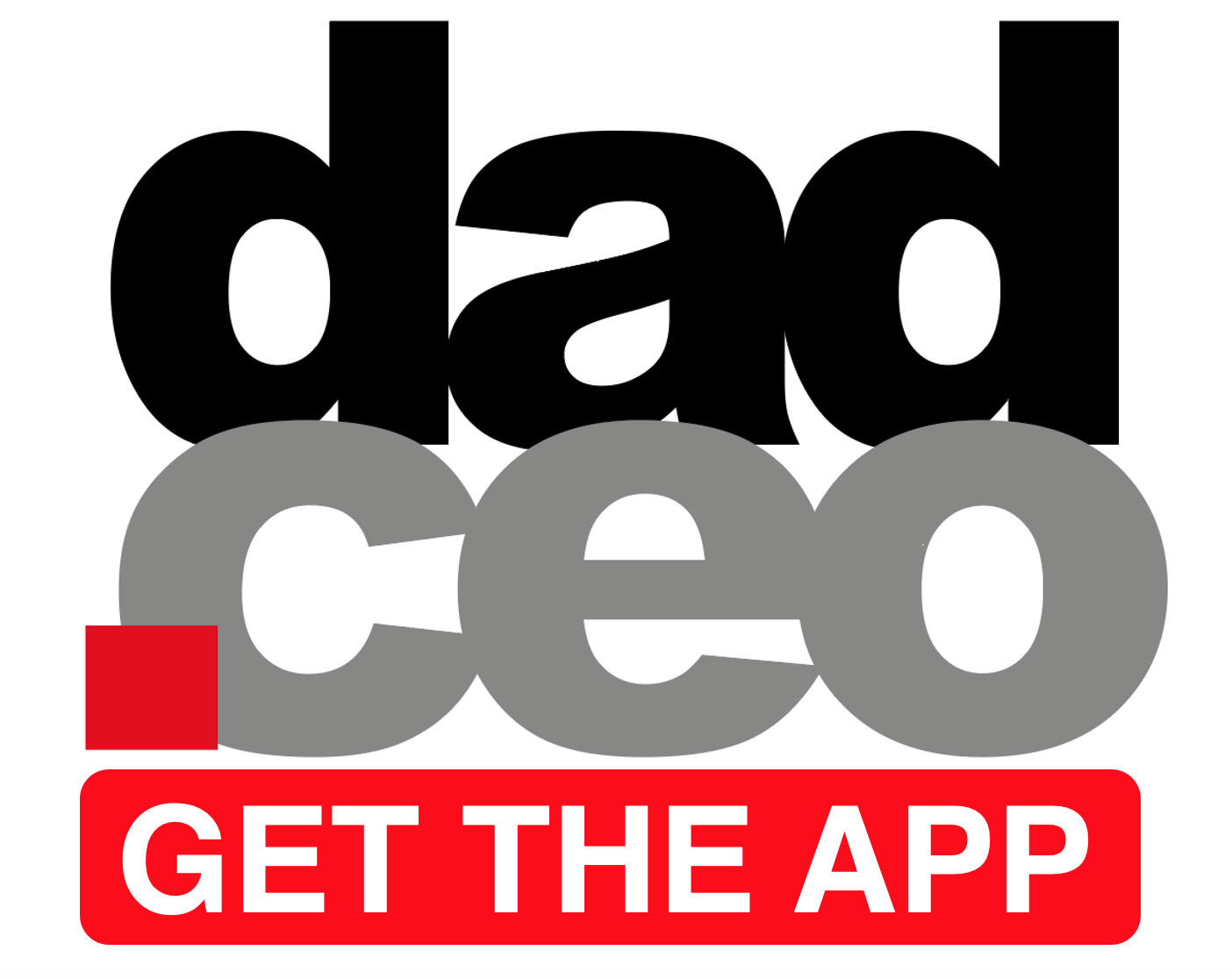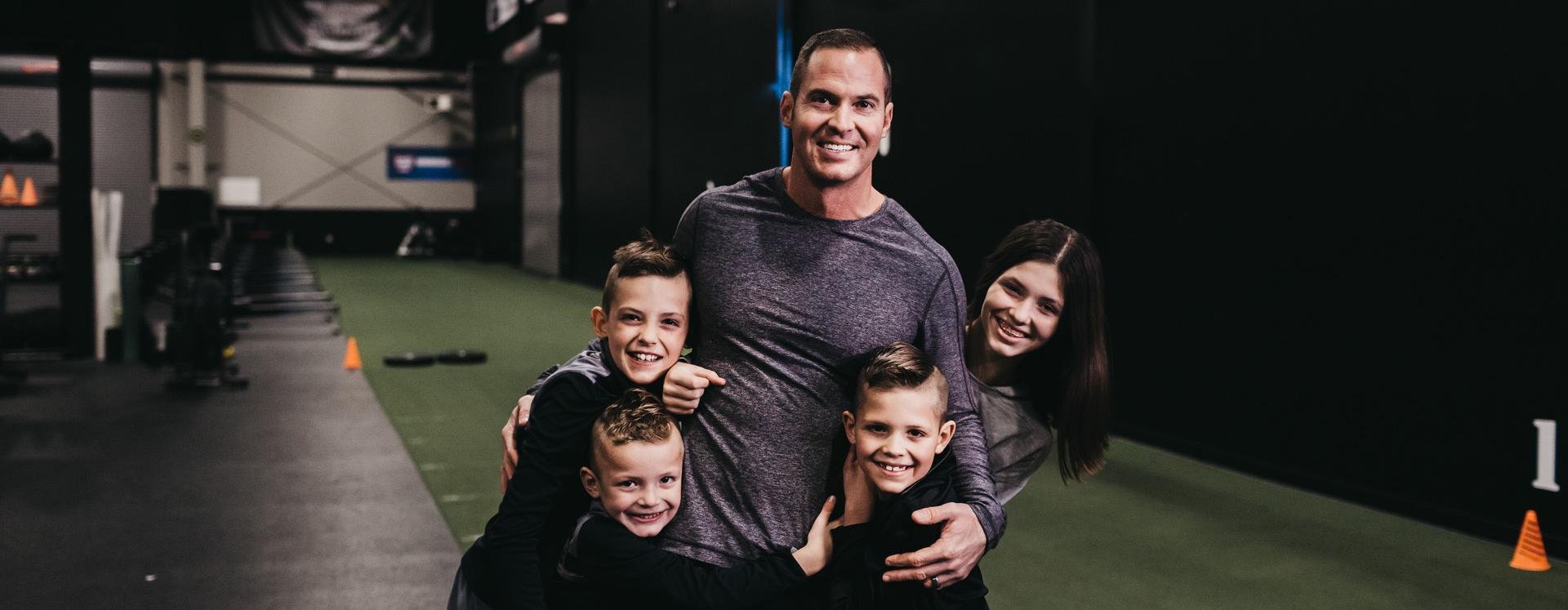Today, DAD.CEO has the honor to interview Justin Batt who is the CEO of Daddy Saturday and DadBOSS, a successful serial entrepreneur, an international public speaker namely at TEDx and, a multi-published author, and a regular guest on multiple podcasts.
Justin aims to disrupt fatherhood with intentionality, by creating intentional fathers who raise good kids who will become great adults.
He founded Daddy Saturday in his own backyard with his four children, and it’s grown into a national movement engaging father’s across multiple channels, including YouTube, social media, the Daddy Saturday book, an Alexa skill, a podcast, merchandise, live events, and a foundation, through which Justin plans to impact 10 million fathers in the next 10 years.
Listen to the full interview with Justin Batt, hosted by Luc Chénier of DAD.CEO
DAD.CEO: Justin, (in your TEDx speech) you were talking about the crisis of being ‘fatherless’ and even more so, it’s also about parents with children who are simply not involved in being present in their upbringing. Could you give us some insights and context into that subject, and more so with the situation that we are finding ourselves in (COVID-19 pandemic) that is affecting all of us?
JUSTIN BATT: Yes, I think as I learned when I started to dive into this topic of fatherlessness, I learned there were 2 forms of it. You have the lack of a biological dad in the home which I referenced at my TEDx speech where it’s over 20+ million kids here in the United States alone who don’t have a dad physically living in the home, but even more prevalent is the child who has a dad who is physically there, but they are emotionally absent. That was the dad that I was compelled to go out and help like through Daddy Saturday and our platform of being intentional and being engaged, I had an answer that I had found in my own family because I was that dad for a period of time. I was a corporate America dad, trying to manage it all with a family of 4 kids and my wife having her own business and trying to juggle all the balls at once and found that I wasn’t doing so well on my own in isolation trying to be that dad.
I really uncovered this deep-rooted issue here in our country as well as across the world where
"There are a lot of fathers who are physically there in their kid’s lives, but they are emotionally absent."
And, I think that this is in fact even more damaging sometimes than the dad who isn’t there altogether, because that dad, kids learn to adapt and they have coping mechanisms and it’s hard, but the dad is not there and they just come to terms with that. I think it’s even harder for the kid who has a dad that is there, but he’s simply not engaged.
So, I just felt really called and compelled to create and plan, a mission, and a platform that could help reignite those dads. To give them a pathway to being more intentional, more engaged, and getting more involved in their kid’s lives in a way that they were designed to be as fathers.
DAD.CEO: Do you have any work/life balance tips? Because everyone seems to be searching for that ‘magical silver bullet’.
JUSTIN BATT: Actually, I believe I do!
"I think that this work/life balance is simply a myth and you never truly established balance."
I believe there is a tension that is always going to exist between work and home, and that tension has changed dramatically now with COVID-19 because the integration of work and home is now completely intertwined as most people are working from home and I think that’s going to be perpetuated even when we get out of this high-intensity COVID-19 environment. So, knowing that this is not about to change, my ‘silver bullet’ is the fact that it’s not about ever achieving some sort of balance, it’s understanding how you manage that tension. If you’re able to manage that tension well, especially when those 2 are now intertwined and knowing that it’s not like you just came home from work and you can turn that part of your day off and turn the home part on.
When I walk out of my home office, the kids are there and you will need to find a way to adapt to that. So, the key is to know how to best manage the tension and how you manage the tension by being intentional. How you are intentional in that specific environment is that you plan things on paper on purpose. I have chosen to integrate my work life into my home life. I’ve taken a lot of the principles that I used in the corporate world and as an entrepreneur, such as establishing mission, vision, values, goal-setting a painted picture. All of those tools that we use in business I’ve brought into our family where we set goals together.
We establish our individual as well as family goals. The kids set their goals at the start of the school year and my wife and I set ours at the start of the calendar year. We have a family mission statement, vision, and family values and a painted picture of what I want my family to look like 20 and 30 years from now because that’s the trajectory with which I am trying to raise my kids. It’s not about the next year or 2 years, it’s about the next 20 or 30 years and how I raise good kids that will become great adults.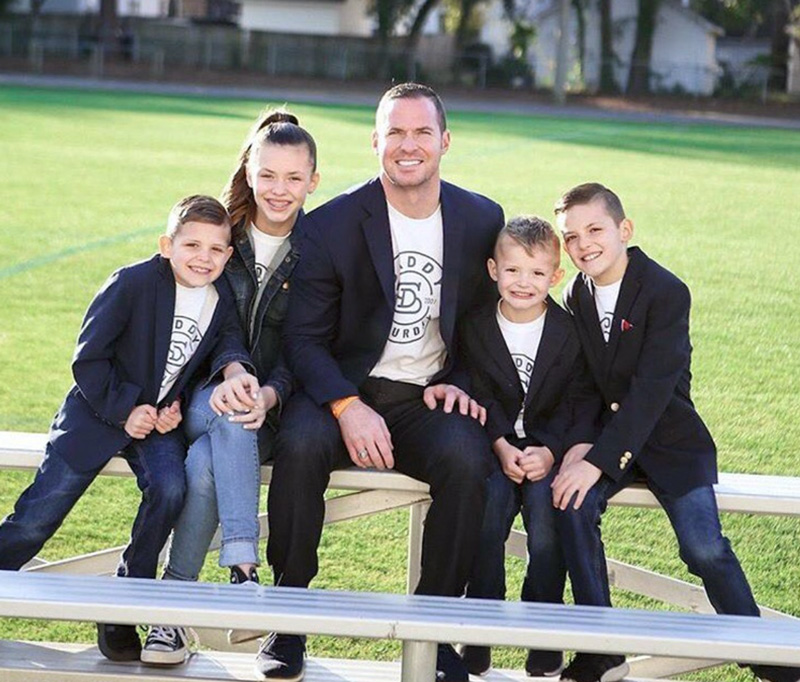
Justin Batt and his 4 children (L-R Mason, Hayden, Easton, and Blane).
All of that ties back to how you manage that vision daily. If you look at it like you have your day which is always busy with a million things going on, if it’s planned on paper on purpose, and you put a date-night with your daughter or attending your sons' ball game or having a date-night with your wife, and you put that on your calendar with the same intensity you would hold any important business meeting on not missing it or being late and when you’re there you’re present and engaged. That in of itself is a great way to manage the tension because now you’ve helped compartmentalize your day so that when you’re working and when you’re done, you’re there and you're present and emotionally engaged with your kids and your family.
DAD.CEO: Do you feel that MOM.CEO’s have had it harder than DAD.CEO’s at balancing the work/life duties, especially more so now with the whole pandemic and forced isolations, etc., As well, many DADs have risen to be more engaged in their kid’s lives, but are DAD’s getting a bit too much credit for things that MOM’s have been doing forever with little to no gratitude?
JUSTIN BATT: That’s a great question. The way that I view is that that they are very distinct roles when it comes to the mother and the father in the home while the role of a CEO is separate from that. When it comes to being a CEO, be it a man or woman, they all have unique skill sets and abilities and talents to that position because they bring something unique to the table and they have risen to the top in their field. So, being a man or woman as a CEO I think the male/female piece of that, yes, there are some small idiosyncrasies, but for the most part, if you are CEO and you do the job that you’re called to do and you use the talents that you’ve been given to get that job done.
I think that in-home is very different because, in the home, there is a very distinct role between a mother and a father. There are things that in society that have changed over time and I think is partly stereotypes where you look back and it certain aspect were like the ‘disengaged dad’ and the dad shaming that went on for so long where dad came home from work, regardless of their position and that dad would have a beer in his hand watching TV and being ‘checked-out' while simply sitting there while mom cooked dinner, did the laundry and everything else around the house, even if she was working mother. That was the stereotype that had been perpetuated and I think what happened is that we’ve uncovered some of the ways that the real dads are out there doing it, by being involved, participating, and taking their share of the load. Pretty much dividing and conquering which is what any good CEO does, they delegate and they learn what they like to do and what they don’t like. Being their leader, they apply what they are good at and what they are not good at and they use their team accordingly. This applies in the same way at home as it does at work where you apply what your strengths are based on the environment and adapt as best as you can.
All I think we are seeing now is the unveiling mainly due to social media and technology and we are simply seeing more of it. I’ve seen more dad dance videos and dads being silly with the kids in the house than I’ve ever seen and a big part of that is because they are there physically and you add to that being present and engaged and guess what?, you are seeing the true form of a dad in the home and I want to see more of that and I want to encourage more of that and I hope when we get back to the ‘new normal’ that doesn’t change.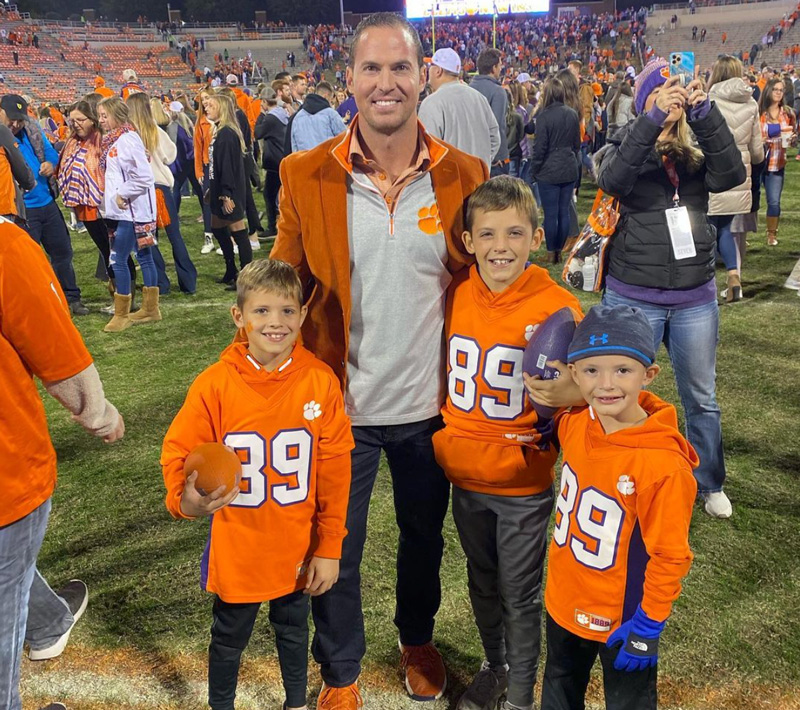
Justin and his boys catching a Clemson College football game.
To address your comments specifically, I would say that it is harder on a MOM.CEO only in the sense that there are certain things that moms don’t have to do, but moms just do because they are moms and it’s what they are great at and part of that is nurturing. There is a piece of being a mom that is just different than being a dad and if you’re a MOM.CEO, then you will have a lot of responsibilities both at the office and home and so in many cases you may see the dad taking on the roles that the mom would historically play because the mom has a truly intense career and is very engaged and involved at the office. So, the dad has to step-up and there is nothing wrong with that as long as the delegation of the roles are being performed in the way that they were intended to be,
"MOM and DAD working in unison where 1+1=3"
DAD.CEO: We heard that you recently bought a farm? What was the reason for that? Was it for the family or what there a farmer within you that was looking to get back to his roots?
JUSTIN BATT: It’s actually a ‘Gentlemen’s Farm’ at this point and we are slowly adding animals which means the work is quite minimal yet to be considered a true farm in the sense that you might think. It’s actually been a life-long dream where we would live on the land and raise our children in a different way. A few years back, the Koch Brothers mentioned in an interview that if you could hire an MBA or someone who grew up and worked on a farm, which one would you hire. The Koch Brothers answered that they would hire the farmer before an MBA because they have grit, they have real-world experience, and completing a job until it’s done right – with hard work, discipline, etc. as opposed to an MBA who just basically received an education. I’ve always loved that quote and it’s always stuck with me as I grew up in a farm community in Ohio in my youth. So, I was exposed to that and while my kids have grown up for a majority of their lives by the beach, and it was a great environment for them to grow up in, but at the same time you felt like you were living on a permanent vacation and we just wanted to make a change.
In addition to all of that, we launched an event venue on our primary residence in order to build some form of passive income and use that as a tool. Through our non-profit foundation, we are now launching a program for kids who can come to the farm and spend a few days with me and my team.
We recently had our first class which we call the DadBOSS Academy where we teach them the principles of Faith, Family, Fitness, and Finances and really give them a reboot which is a way to help set them on a different trajectory by teaching them things that they will not learn in normal life. And, maybe for the CEO father who hasn’t been there or engaged, is a great way for us to inject into that child some of the core principles they need and maybe for a child who doesn't have a dad. That was the case with 2 kids who attended our academy and who came through a scholarship where we taught them all the core principles and they were able to learn a whole lot in a couple of days and come out of here with hopefully a different trajectory in their lives.

Justin filming a DadBoss episode.
All of this was part of the plan and process to get a farm where we could raise our kids in a different way, to build a passive income on our property, and to create an environment where we could use it as stewardship and as a blessing to other people that may or not have a father or have a disengaged father as a way to teach them some of the core principles around life.
DAD.CEO: Do you think it’s smart for a parent to invest in their kid’s business or should the kids actually go out and earn it on their own while still having the emotional support of their parents?
JUSTIN BATT: I’ll answer the question in 2 parts:
Firstly, I think it’s really important and we encourage all of our kids and anyone that comes through our academy to work with them on starting their own business. In today’s day and age, I feel it to be very important that having our kids with all the technology that surrounds us and how apt they are to just be consumers. Therefore, I’ve thought our kids to be curators and content producers, and part of that is by owning their business which most of our kids have their own online businesses. That is a really important core aspect of our family as well as our platform. I believe this is first and foremost. For every kid in today’s options, it could be that the traditional paper route maybe in today’s context,
"They are now a YouTuber".
They are still mowing lawns and such as we did in our youth, but now they are actually creating and distributing content rather than just reading about it. It doesn’t matter, the whole point is they are still going through and learning the principles of entrepreneurship because there is so much and even more now with technology to be learned.
From a parent’s standpoint, I think there are multiple levels of investment. There’s the investment of helping them form the idea of what their business should be. There’s the investment of your time in helping them form that business and get it underway. There’s the investment of money as they will need some start-up capital in order to get their business launched or supported to grow. As a parent, I feel there is nothing wrong with helping them with that especially if you are part of the process and planning by assisting them in creating a business plan, setting goals, teaching them the basic principles of marketing, etc. All those things are so valuable, why would you not want to invest in that?!
"We spend so much frivolous money on our kids such as buying them shiny plastic things, why would we not want to maybe use that money instead to help them invest?!"
Secondly, something that I have done with my middle son Mason who is really saving all his money, which I congratulated him for his discipline on saving, but told him that simply saving your money and putting under your mattress is not going to help it grow. So, we started talking about the rules and principles of investment and we got an APP where you can invest in micro-shares by investing in fractional shares of a company. So, he had his own money and I helped him with a little bit of knowledge. With limited risk, he could buy a share of Apple, Nike, or Amazon or whatever interested him and he could buy a fraction of that share and while learning the process of investing and how stock appreciates and grows and why he wants to invest in those companies. There are tons of value in that!
I would say YES! and YES! invest in your kids in starting a business and help invest in that process and there is so much growth to happen there. And, if more kids were given that opportunity earlier on, society would a very different place.
Justin's daughter Hayden Batt and her online business Sunday Lightning www.sundaylightning.com
DAD.CEO: Why are we not teaching this to our kids in school? The basics of taxes, investing, etc. It seems so logical, yet it’s always absent from the curriculum to get them ready for the real world?!
JUSTIN BATT: The kids that came over for the DadBOSS Academy, needed to join their schools virtually during that time due to the pandemic, distance, etc. I was listening in on their lessons and especially the content and it was great stuff if you want to become a scientist or learn about culture and history, etc. But nothing that I heard was teaching them about real-life in-demand skills. I feel this is the failure of so much of our education system not only in the United States but around the world! So, unless you get your kids a private education or a hybrid version, your kids are not going to get access to those tools. That means that it all falls back on the parents and it goes back to the first part of our conversation where you have either a fatherless generation or disengaged parents and the kids simply are not getting that.
This was a core reason why we launched the DadBOSS Academy which includes coaching so we can teach kids those principles around core character qualities they need to possess in order to be successful in life and to have the experience and exposure to things such as Faith, Family, Fitness, and Finances that they won’t be able to get anywhere else, especially at school.
DAD.CEO: What top lessons did your parents or a mentor teach you that you feel is still relevant in today’s digitally connected world?
JUSTIN BATT: Growing up, my dad was very involved with me in terms of just the actual time that he would spend with me. He had quite a hard upbringing and it was one of those things where a father wants to improve his kid's experience from their own. He would spend quite a bit of time with me and most of it was simple time spent together such as playing catch in the backyard, throwing the football, or just washing the car or doing yard work. So, it was fairly simple things, and the lesson there and what I have taken and brought into Daddy Saturday is to be intentional and engaged with your kids doesn’t have to be expensive, extravagant, or extraordinary in order to be EPIC! Now my dad did not call it that from what we did, but that’s what I took from that experience from my own father.
Some of the best memories I have are from the most simple times that we just spent together and mostly the time that he invested with me.
So, I feel that first and foremost one of the things that really translate well into today’s day and age which is fast becoming digital which is why we need to get back to some simple times together and doing more practical things with our kids. This can be board game night, playing card games, or going for a bike ride, or even something as simple as a walk. A good example is we have a trampoline where we often just lay on it and look up at the clouds or the stars while just talking and laughing, etc. and those are some of the best memories I have with my kids.
Another good lesson is from Dave Ramsey who was a digital mentor of mine at an early age, and I followed many of what Dave’s principles were on finances. One of the things that I learned most from Dave was the power of being intentional with your money by planning it on paper and with purpose by budgeting and taking those simple practices and again in today’s digital age, everybody needs an APP or some sort of accounting software, etc. All you really need is to take out a piece of paper and draw the ledger on the left side with deposit and withdrawals, and you make your budget and your line item. Therefore you don’t have to be sophisticated. There are times where you can use technology and times where you don’t need it. The point is that behavior that matters and the principle that came from that is
‘Feelings follow behaviors and behaviors don’t follow feelings’.
Personal letter to Justin Batt from Dave Ramsey.
That was a core principle lesson that I learned from Dave Ramsey. I never felt like following a budget or working out in the morning, but I’ve worked out for more than 25 years now consistently in the morning, as well as making a budget and planning our family finances pretty consistently. I can honestly say that I am not perfect, but the point is that I never feel like it, but I JUST DO IT! Because when you force yourself to do something, the feelings end up following it. The feeling of satisfaction that you planned your money on paper before the month begins.
Same with fitness, you’ve gone and exercised and you got your endorphins going and you feel better about yourself so therefore you make better choices throughout your day regarding what you eat and how you sleep and other factors because you’ve invested in yourself and feelings follow behaviors.
DAD.CEO: Have there been instances where you saw your kids about to make mistakes, but held back from intervening in order for them to learn from their mistakes and hopefully grow from the experience of failing?
JUSTIN BATT: This is one of my favorite topic’s Luc, and I’m so glad you brought it up! I feel this is one of the biggest challenges facing this generation that is coming and the one before that.
We as a society and especially as fathers have tried to become the hero of our kid’s story, whether that’s through validation or because it’s a role we think we need to play. A lot of times we prevent our kids from failure. You’ve heard the terms such as ‘helicopter parent’, ‘snowplow parents', etc.
There are a million different terms depending on who you ask and all that means is that you are stepping in and removing that opportunity for the child to experience success or failure on their own. My viewpoint is that the parent needs to step forward as the guide, especially the father to allow the kid to be the hero of their own story in experiencing success or failure on their own. As a result, they get to learn from that experience and they get that early exposure to it and the father or the parent gets to serve as the guide to help them through that process by letting them learn how to experience failure, to fail forward, fail hard and fast, but to fail in terms of micro-failure so they can learn to move towards success.
"Failure at 8 years old is way different than failure at 28"
We've seen many kids who have grown up in a society where they haven’t been able to experience failure, where they are protected and preserved. Once they get into young adulthood and they experience a significant failure such as a job loss, divorce, disease, financial issues, etc. Whatever it may be, they won’t be able to deal with it because they never experienced failure before and therefore they have no coping mechanism on how to deal with it. So that means that we are creating a generation that does not know how to fail and that is a big problem!
Most people that you see that are successful today are mostly standing on top of a ‘mountain of failures’ and that’s how they reached that point of success, and so this goes back to our earlier subject of kid’s starting their own businesses or participating in competitive sport because all these environments are training grounds for experiencing failure if parents allow their kids to experience that on their own while acting as their guide along the way.
'FAILURE FRIDAYS'
I’ll give you a specific example. There are plenty of times in our family where we take part in something we call ‘Failure Fridays’ where we will talk on Friday evenings around the dinner table on things we tried, failed, and what we learned from it. If our kids are not talking about something they tried and failed at, it means they are not pushing themselves that week. My wife and I have to participate and we are all in on discussing failure openly and candidly as a family and we are there to support each other to move forward. So, there are plenty of chances where we keep it top of mind and it’s always hard as a parent, if not an easy thing to do by allowing our kids to fail.
There are so many instances where your child can fail. A good example is that I am coaching football right now and my 2 youngest boys happen to be on the team that I am coaching. We had a scenario last weekend where we had the perfect play call, and I called it up for my son who plays defense. It’s was a 4-in-1 situation where if they got the 1st down it would hurt in a game where we were already behind and we needed to get the ball back. My son went for the play and missed the player and they got the first down and we ended up losing the game. Ultimately, losing the game was not his fault as it was a 1 play amongst many. He had a chance to step-up and either get success or failure. But I put him in a situation and I allowed him to determine the outcome based on his own result and I did not dictate anything other than calling up his number to play. After the game, we had a conversation and we talked about what he may have done differently and he learned from that scenario.
I guarantee you from the way he's built, it won’t happen again as that is just how he is as a person. But at the same time, I preserved the relationship over the result. I think this is a very important part that parents need to understand is that after the game, we still went out and got ice cream. We still had that father-son relationship and I was not critical of him for not having success on that play and did not blame the loss on him. We talked about the situation, isolated it and he learned from it and we moved on and our relationship remained intact.
I think it’s a really important piece that a lot of parents need to understand that you need to watch and check yourself as to how much you are putting the relationship over the result or the result over the relationship, and being critical of your kids after they have a failure or don’t live up to your standard – always preserve the relationship first and foremost!
DAD.CEO: The word NO is a truly powerful word in business, but how does its meaning work in your home, or is YES the opposite used for you in order to have a better impact and results with your kids?
JUSTIN BATT: We’ve had this discussion recently in our household and it’s acutely on my mind. I would say that you would say NO more often than you would say YES, and it’s easier for me than it is for my wife, as I am not afraid of conflict and in fact, I’m a challenger myself by nature, and 2 of my boys who happen to be extreme challenger's. I just know that half the time they simply will challenge for the sake to challenge and that makes it easier to say NO to them. But I understand my kid’s personality style and I know now how to say NO to them in a constructive way. Because if you simply point-blank say NO and you have a child who is a challenger, then you have drawn a line in the sand and they will simply keep bumping up against that line to push you. Therefore, you need to understand that you just can’t say NO to a challenger, But say NO and provide an alternative or explain why you’re saying NO.
The old adage of saying simply NO and they ask why? And all you can come back with is:
“Because I’m your parent and this is my house!”
I really don’t think that works for most kids. You need to provide an explanation, especially as they get older of why you are saying no.
But, NO can also preserve your best YES. With kids, the subject of diet is a big one! Kids will talk about how they want to eat fast food and the convenience of getting something on the way home from school or when they are out and about. As a family, we made a commitment that we eat dinner together at home and we don’t believe that fast food is the best option. I’m not saying that we don’t eat fast food as we are at Chic-Fillet a few times a week. At the same time, we preserve that YES for when it’s the best opportunity and we also ask our kids to earn that YES. We believe that nothing in life is given and should be earned.
A good example of that was this morning, my daughter asked to go to Star Bucks for breakfast to get an egg-bacon Gouda sandwich which she simply loves! She was literally digging her heels in threatening not to eat anything for breakfast unless it was Star Bucks only. We had made the commitment that we would only go out for breakfast once per week and it was to be considered a special treat that they have to earn by helping around the house without having to be pushed to do something good. If you don’t help, then we won’t go out for breakfast. I sometimes leverage my NO with reasoning. So now, it’s not me just saying NO to say NO, I can now say NO because they did not deliver what they were asked to deliver. How can they argue with that? So I ask them to think critically on that and had they done what they were asked to do, then they would have received what they asked for, but because they did not, it’s a simple NO and it’s for them to accept that they created the NO, not me.
DAD.CEO: How do you unplug with your family knowing that your business is also based at your home?
JUSTIN BATT: This goes back to intentionality, and even I still struggle with this. Balance is never fully achieved. It’s a pendulum that swings back and forth and it’s all about managing that tension. I’ve had so many things going on for so long in my life that I have become very good at knowing how to compartmentalize things. The way that I have achieved it and this may surprise some people but it’s what I feel is a great tip!
I have my ‘4 big life buckets’ which are FAMILY, FAITH, FITNESS, and FINANCES.
If what I am doing does not fit into one of those buckets, then I quickly need to cut it out of my life. I compartmentalize my time so much into those 4 buckets that I find myself not wasting a lot of time. I’ve put myself in a position wherein the free time that I have allows me to engage with my kids. I use what some would say is traditionally unproductive time and made it work for me to spend more productive time with my kids.
Great examples of that would be dinner time where most families would say how fast can we sit down and eat, rather we do play a game as a family where we go around asking questions and creating topics, etc. This becomes a productive time. Another one is ‘Car Time’ – usually a very unproductive time, right? Listening to music, kids on the devices, etc. We don’t do that. We speak to each other, play games, etc. We use this time to be productive, to grow the relationship as a family.
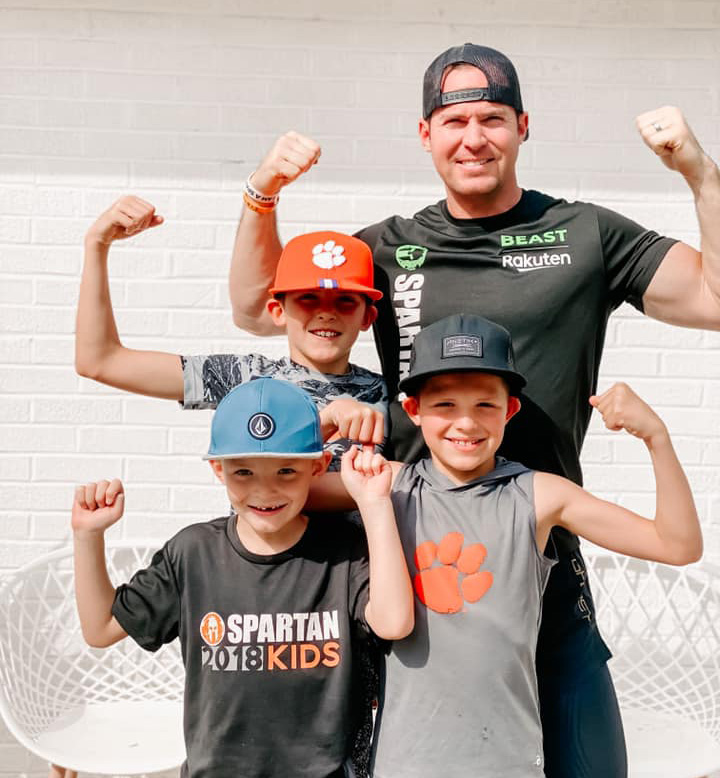
Strenght in family
Also, I’m very intentional about having 1-on-1 time with my kids. Having 4 kids, it’s really hard to get just 1-on-1 as all of them want my attention all the time. My daughter is now what is considered a ‘Pree-Nager’ (12 years old) and she wants to be alone a lot of the time in her room doing her own thing. I am very intentional about scheduling the whole 1-on-1 time with each kid as it opens up the dialogue & communication on what is important to them and you get to see their true personality that comes out as you don’t have the dynamics of the other siblings interfering. This has really helped me in being truly intentional in using my time wisely for each of my kids. We’re also intentional in doing what makes the most sense to them whether it's having breakfast early in the morning or going for ice cream last night or something as simple as taking the dog out for a walk together. I think a lot of it all comes back to making the highest and best use of my time at home with my kids and being able to shut it down.
The last thing I would say is, technology can be a blessing and burden and I’m working my hardest and doing my best to put boundaries in place so that when I’m with my kids, my technology is put away as this can become such a huge distraction tool. Being with your kids, if you’re still using technology or they see you dodging your eyes back to your phone, answering calls, emails, or looking at social media, etc. That’s not being fully present and engaged with them.
I’ve also worked on it even if it's just 15 minutes with the kids or 1-on-1,
"My time is fully there, fully dad, fully present!"
DAD.CEO: Any traditions that you brought from your childhood? Or have you created new ones as a family?
JUSTIN BATT: Yes, we have some family traditions especially around the holiday season that we try to keep alive such as decorating the Christmas tree such as hanging all the fun ornaments that that kids have made over the years, etc.
But for the most part, I’ve created a lot of new traditions such as every morning before the kids go to school, we have a rather big hill that is our driveway that leads up to our house which is just shy of 400 feet of elevation. So, every morning, we walk down the hill to the mailbox and we walk all the way back to the house before the kids leave for school.
 The daily tradition that includes 'Heavy Day' each Wednesday
The daily tradition that includes 'Heavy Day' each Wednesday
That tradition is meant to help them conquer/achieve something at the start of their day and overcome an obstacle to get their day started on a positive note. It’s a big climb and your legs are definitely burning as you reach the top! Wednesdays being ‘hump day’ as it’s the middle of the week, I make them carry heavy stuff such as rocks, sandbags, kettlebells in their book bags, etc. The craziest thing is, that after doing it a few times, they ask me now if it's 'heavy day?'
"Dad, let’s go, it’s time to climb!"
They are now proactively asking me to do it because they see the value in it and we have amazing conversations. It’s become a really incredible tradition for our family. It’s something I am sure we will look back later on in life or when times get hard, whether they are in the home or out of the home, and they will look back and remember. There is one part of the hill that I love which is the steep incline and they’ve been trained to say when we get to that part of the hill;
“Is this the hard part of the easy part?”
While most people would say it’s the hard part, my kids say it’s the easy part because the power of the spoken word is so powerful that what you speak out loud usually becomes true, and the same goes for believing about what’s possible in life when visualizing it.
DAD.CEO: When you’re much older, how would you like to look back and be remembered as a CEO and as a father?
JUSTIN BATT: That’s an awesome question! I’ve done a painted picture for both
"I have set a dream for myself as a CEO to reach 10 million fathers in the next 10 years and end fatherlessness."
That’s my corporate philanthropic goal. We have a for-profit and non-profit, so the goal is to reach that many people for the non-profit side. But, for the for-profit side, I would like us to be listed on the Inc. 500 and 5000 lists, and to be recognized as a top company in the fatherhood space which I think is truly a unique and incredible goal.
As a CEO, I want to be seen as someone who has bridged the gap between fatherhood and the corporate world and has brought the two together and managed the help a great number of people as well as having changed the world in this generation in the way that they look at fatherhood, family, and being an intentionally engaged father by making a tremendous impact in the lives of people.
In short, as CEO, I want to be seen as a person who has created a legacy of stewardship around fatherhood.
On the family side, I have a painted picture which is my family 20 or 30 years from now. Therefore, I am looking at all of my kids in the long-game type of picture since I will turn 40 years old this January, which makes me think about who I would like my kids to be when they turn 40? Notice how I said who do I want my kids to be and not what do I want them to be. It’s far more important to who they are as people than what they do. 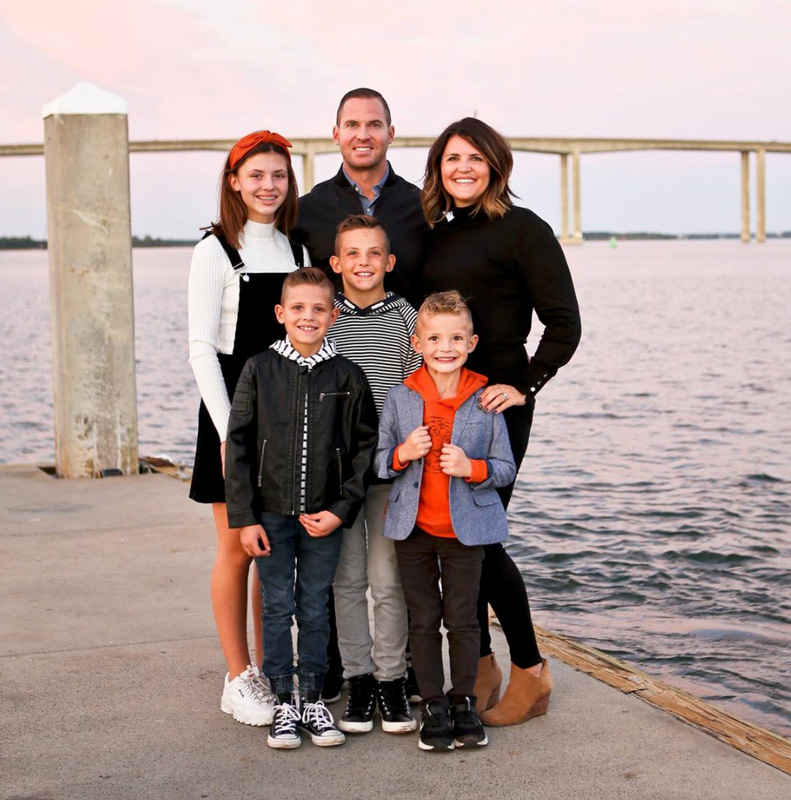
Justin & Heather Batt and kids.
I would like to seen/remembered as a father who has invested in his kids, who’s been intentional, engaged, and who created epic memories that we will speak about in their later years and that they remember for the rest of their lives. A father who helped them identify what their unique calling is in life and who gave them a platform to jump off and go out and get it and were able to help change their generation with what they’ve been given and what they’ve been called to do.
DAD.CEO: What would be your top tips for being a successful DAD.CEO?
JUSTIN BATT: Again, you have to be intentional in every single area and aspect, and that word is something you will be hearing me say over and over again because this is the core character that it takes to be a successful DAD.CEO. You have to be intentional and you have to take what you do at work and bring the positive aspects of that back into the home.
1. “Direction and not intention determines the destination.” I just love that quote because as a CEO and as a father, the direction of the company and the direction of your family determines the ultimate destination. We just talked about how you want to be remembered as a CEO and as a father, and the direction that you set your family in and the direction that you set your company in is going to determine the final outcome. It’s not the intentions that you have. Intentions are not enough as they don’t matter frankly. Setting that direction by having a ‘true north’ by having a compass, by having mission, vision, values, goals, etc. that you set for your business and your family, and then you work towards accomplishing those by working backward just like you would in your company and you say: “OK, this year, here is our annual goals, but what will I do this quarter, this month, this week and today to make that happen?” you then start to put these simple things in your life, your family and kids life and that is how you move forward in life.
2. Plan if on paper on purpose. I cannot overemphasize this enough. We have a planner which is called ‘The DadBOSS Planner’ and it’s based on Michael Hyatt’s full-focus planner which sold more than 100,000+ copies which is one of the top-selling planners. We 'white-labeled' it for DadBOSS and gave dad’s a tool that they can use where they can set their goals and plan their day on paper and with purpose where they can plan out those family events in the planner and hold them with the same amount of accountability as you would for any business meeting or opportunities.
3. Finally, create the boundaries that will help you manage the tension. Put away technology and create the settings and the scenarios where you can have that intentional and engaged family time where you won’t be distracted by technology. For myself, this happens on Saturday’s where I can set aside truly engaged time with my kids. Instead of golfing and doing what is important to me, I focus on what is important to my kids and spending time with them intentionally. You need to understand that you have a limited amount of time with your kids. Each child has roughly 930 weeks spent in the home – So, if your child is 9 years old, they are already halfway gone from your house.
"My daughter is now 12 and we have only 6 years left with her in our home."
This means you have such a limited amount of time to truly impact and make an impression on your kids to help them be successful in life that you need to take advantage of every opportunity that you can have. Remember, it does not have to be expensive, extravagant, or extraordinary to be epic. Kids are going to look back at those epic memories or moments with appreciation.
4. A final tip would be to travel with your kids and try to also do it 1-on-1. We do it at 10, 13, and 16 years old. It’s called ‘The Winner’s Travel’ and again it does not have to be expensive, extravagant, or extraordinary to be epic. It all depending on your budget. We are very fortunate to have the means to do some very interesting things.
My daughter and I have gone to New York City where we attended 3 Broadway shows in 3 days, visited the birthplace of Hip Hop, and ate at some fabulous restaurants.
"I learned more about my daughter in 72 hours of being 1-on-1 with her than I had in 10 years of her life."
It was an incredible opportunity and we still talk about that trip to this day. It was a building block and a catalyst for our relationship. Remember, it’s never too late to start. If your kids are past that point, do it anyway! It’s never too late to engage your kids in that capacity and they will look back and speak about those trips for the rest of their lives. 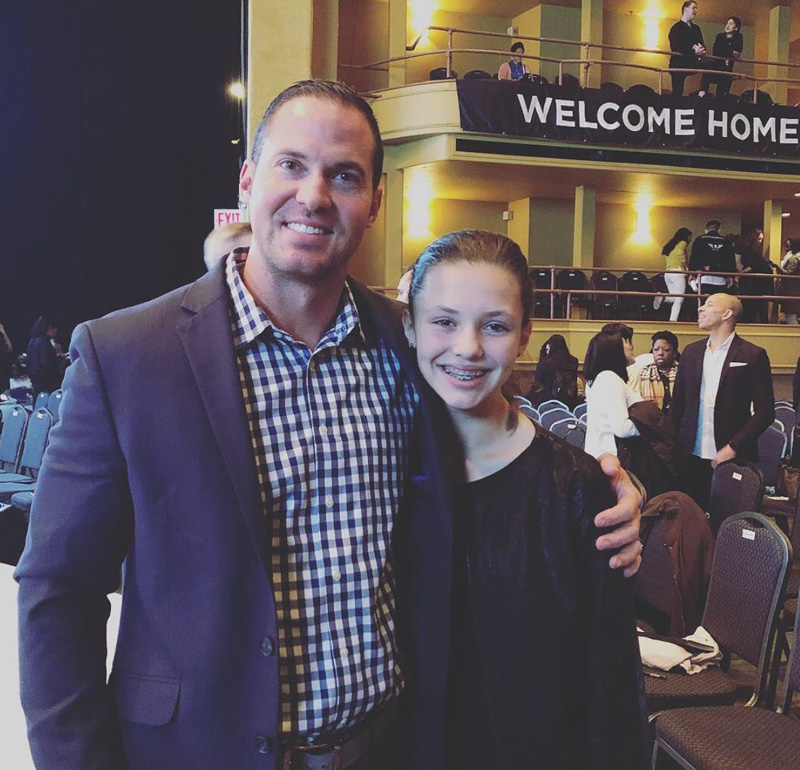
'The Winners Circle' 1-1 time with daughter Hayden in New York City.
DAD.CEO: Do you have any last words of wisdom that you feel are important to dads out there?
JUSTIN BATT: I would say that something really important is as a CEO or a Leader, your kids are going to catch far more from you than you could ever teach them. What they see you doing, how they see you live your life such as behaviors, morals, values, and how you approach life, they will learn far more from watching you than what you teach them. The way you approach faith, food, fitness, and how you treat other people such as your wife, husband, or partner, your kids will learn far more by catching than teaching.
The importance of modeling for your kids is paramount by letting them in and letting them see you in your element and environment which is also critical. Let them into your business conversations. Let them see and have those conversations with your kids where you can teach them through those moments, but also let them catch from you and the everyday things that are so important for helping them establish great values, habits, and rituals that they can build on for the rest of their lives. Because, if you’re not doing it, they won’t do it either. How can you expect your kids to do things that you’re not doing yourself?! If that means making their bed in the morning and your bed is a mess, then why should they make it? If they see you making your bed, they will be motivated to do it as well. They see you eating healthy, they will also get the habit of eating well. They see you taking care of yourself and exercising, then it will become a habit that they will aspire to reach also because they see that in you.
"So far more is caught than taught."
Be the example you want your kids to see which is paramount and cannot be replaced. It's something that is on you as a CEO, as a Leader and that applies equally in the workplace as it does at home and being a Father.
It’s even more important at home because your kids are so perceptive, they are real sponges absorbing everything in whether you notice it or not.
A good question to ask your kids regardless of their age (the earlier the better) is:
“What does dad do? What is dad’s job?”
et them answer that question open-endedly and hear what they have to say. It will be truly revealing to you, especially when they are really young which can be really funny as they don’t really know what you do. But as they get older, often time I’ve found that they don’t know or don’t understand what you really do. So, then I will put into context for them and it’s really cool because if you do it right, you give your kids your reason why.
A good example is that I’m in the publishing industry and I’m an Associate Publisher for a company, so what I do is I tell my kids who know that I’m a Publisher and I ask them what that means? I then tell them that I help people share their stories with the world by becoming an Author. I help people grow their business by helping them create a book. For them, this is really cool because if anyone asks them, they can clearly answer that “My dad is a publisher and he helps people tell their stories and share them with the world!”
They also know about Daddy Saturday and DadBOSS and our foundation, etc. We’ve had these conversations and all is clear for them and beyond that, I think it’s great to be able to take your kids into those environments such as ‘Take Your Kids To Work Day’ which is a bit more of a challenge now as they see you on ZOOM meetings all day. 
The highly recommended Daddy Saturday book.
I believe it’s very important for your kids to see what you do, what’s your why, and unpack that a little bit, and when it comes to the financials and all that you do for them, it becomes important to give them a bit of perspective. We try to speak to our kids about other less fortunate people who don’t have access to what we have. Without having experienced that, then they have no perspective.
There is an aspect of service, a perspective that you can give your kids that will help break that entitlement such as doing a mission trip or serving your local community or getting them outside of their element to be exposed to something so they can see others who don’t have what you have or what you provided for them and give them that experience and that exposure. I think that the best DAD.CEOs are really good at that and it taps into that service or philanthropic aspect of mini-CEOs that they have. A lot of them are givers and are very generous people. But we don’t often pass that on to our kids.
So, create traditions, create environments, create ways that you can allow your kids to gain that perspective or experience so that when you have that conversation, you’re not just holding it over their heads, you're using that perspective to offer and help to create a breakthrough to that element of entitlement by changing it to gratitude.
LC: Thank you Justin for such a great interview! I look forward to speaking again and delving deeper into some of the topics of fatherhood that we touched on today. I highly encourage everyone to check out the TEDx talk video included on this page – highly recommended!
JUSTIN BATT: Thank you, Luc! The easiest way to find me is @justinbatt on LinkedIn for myself personally.
On all our social media @daddysaturday and our website www.daddysaturday.com that is the hub for all things Daddy Saturday as well as our foundation where you can learn about our work, all the resources we have to support dad’s and their efforts to become more intentional and engaged. www.DadBOSS.com is the site for our digital course on fatherhood as well as the coaching platform, the planner, and the DadBOSS Academy.

